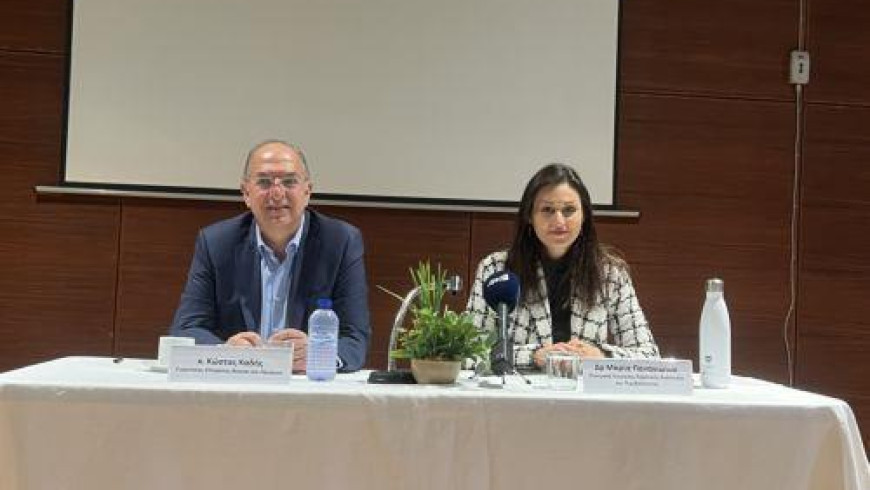
Gender equality is a priority, Annita Demetriou, President of the House of Representatives, said addressing the two-day European Conference for Gender Budgeting, which began on Thursday at the University of Cyprus’ headquarters, in Nicosia.
Annita Demetriou pointed out that ‘’it was about time in Cyprus to discuss gender budgeting’’, stressing the ‘’need to implement our policies into the budgeting and this is the only way in order to proceed.’’ As far as the Government, the Parliament and the political decision-making spectrum are concerned, they implement a lot of policies related to gender equality, she added.
‘’All efforts are to shape the dialogue aiming to advance gender equality and inclusive policy making with gender budgeting being a core part of it,’’ Demetriou said. She also welcomed ‘’the throning advocacy of gender mainstreaming undertaken by civil society organisations, feminist think tanks and women’s right groups in Cyprus and across Europe pushing for greater transparency and accountability in budgetary policy making.’’
‘’We did a lot of things in the House of Representatives, we managed to have Gender Equality officers into the Ministries, who need to implement their policies at last’’, the House Speaker pointed out, underlining the importance of the national strategies. ‘’As the House of Representatives is concerned, it is the first time that we have this issue as a priority and it is important to see what more we can do,’’ she said.
Furthermore, Demetriou used examples of gender budgeting policies in other European countries (Austria, Sweden, UK) that proceeded with the connection of budget and policy making. She also stressed that ‘’we need to do more, we need to take our share of responsibility, because it is important to show our sensitivity and responsiveness to something that it has to do with democracy.’’
‘’We will be able to have the representation and participation of women and young people in the policy making process. It is the only way to be fairer, more inclusive and more adjustable to the challenges that we have to confront,’’ she indicated.
Demetriou underlined the need ‘’to keep these topics up in the agenda, because, for us, human rights and everything that has to do with gender equality are a priority as they are related to other issues.’’ As she said, ‘’it is the only way to survive and proceed and survive in a very turbulent and complicated political period.’’
On her part, Josie Christodoulou, Commissioner for Gender Equality, said that the Cyprus Government has set gender equality high on its priorities, adding that ‘’it is of high importance that we keep the issue of gender equality on the surface, visible, but also through the formulation of targeted gendered policies.’’
Toward this direction, Christodoulou said, her office has been upgraded and now has a role in the drafting of the national strategy, its coordination and monitoring. She also pointed out that ‘’many important steps have been taken in our country in the field of legislative and institutional reform for gender equality as well as the formation of a policy framework with the adoption of National Action Plans aimed at eliminating discrimination and promoting the equality between men and women in various sectors.’’
Without a doubt, the Commissioner indicated, ‘’Cyprus' accession to the European Union has played a very important role on the road towards equality.’’ She added that the harmonization with the European legislation secured many rights and improved the state of women.
Considerable progress has been made over the past few years, Christodoulou indicated, pointing out that there is still much work left to be done in order to ensure that women are in fact equal members of society. ‘’The government is stepping up and has already started the implementation of substantial policies and actions,’’ she said.
‘’The new National Strategy which was approved by the Council of Ministers and entered into force beginning of January 2024, aims to mainstream gender in public policies,’’ the Commissioner went on to say. ‘’That is an important tool in order to achieve a culture and socio-economic environment of gender equality ensuring that government’s decisions have an equal and positive impact on both women and men’s everyday life,‘’ she added.
‘’The Government through the Ministry of Finance has already applied for technical support from the Directorate-General for Structural Reform Support of the European Commission. With an initial positive mark, the final decision on the Cyprus’ application is expected in March,’’ Christodoulou said.
‘’In order to put in place holistic gendered policies and actions there is a need for the collection of sex-disaggregated data in order to better understand the different needs of women and men but also to address them’’, the Commissioner pointed out, adding that the Statistical Service issued the first Gendered Statistics publication in June 2023 and an updated version is expected to be published by the end of the year.
Effective implementation of gender budgeting requires political commitment, administrative commitment, improved technical capacity, civil society involvement and sex-disaggregated data, Christodoulou indicated. ‘’We are on our way there in order to achieve all the enabling conditions to efficiently implement gender budgeting,’’ she said.
In this direction, she went on to say, the government, including the Commissioner’s Office, is working closely with the civil society, women’s organisations, women’s wings of political parties, universities, the private and public sector in order to break down and eliminate stereotypes and prejudices.
‘’The aim is one and it is clear: Gender equality will only add so that we leave in a healthier society and have a stronger economy. Gender budgeting is a tool that takes into consideration the unique and diverse needs of women and men and ensures a fair distribution of resources,’’ she concluded.
Mary Pyrgos, Moderator of the Cyprus Gender Budgeting Platform, said that gender budgeting was not known in Cyprus until 2 years ago, adding that it came to the surface in 2021, when Phemonoe Foundation started research to find out where the Government money was going and why there were no money for women’s needs and projects, while at the same time "much money was spent and allocated for men’s projects" as she said.
In January 2023 there was a conference that led to the inauguration of the Cyprus Gender Budgeting Platform, which is currently supported by 5 Universities and more than 450 NGOs, she pointed out.
‘’We initiated a pilot project to examine the course of the reform in Cyprus, where employees from all departments of the Auditor General’s Office are trained so that they can acquire the necessary skills to successfully undertake the gender audit of the Government budget,’’ Pyrgos went on to say, indicating that ‘’gender budgeting is a very complicated issue that cannot be solved in 1-2 years and we need to overcome many challenges and work very hard.’’
‘’In order to succeed, the Ministry of Finance, the Office of the Commissioner for Gender Equality and the Cyprus Gender Budgeting Platform should work closely together,’’ Pyrgos said.
‘’The women of Cyprus will not accept anymore to be ignored. We want to have a say as to where the resources of the country go,’’ she added. ‘’The Cyprus Platform will be here to ask questions and make sure that the resources of the country are spent in a more just and appropriate way. We are going to make sure that there is transparency, accountability, responsibility and good governance,’’ she indicated.
‘’Governments and economies are trying to find solutions. We should join in as well in order to find solutions beyond the traditional ones, develop new methods and new analytical tools regarding the management of public finances, because they will help design a more effective budget and help the Government work in a more transparent way and distribute the resources of the country in a more just way,’’ Pyrgos stressed, adding that ‘’they will also help citizens, especially women, and allow them to contribute more effectively’’.
‘’We will join forces with European colleagues to push the reform and the necessary changes even further. We can ensure that the Government money will be well and justly spent,’’ she concluded.
On her part, Diane Elson, Emeritus Professor at the University of Essex, pointed out that, if gender equality objectives are not being achieved, budgets need to be reviewed and changed. ‘’Gender analysis of budgets also promotes greater effectiveness, transparency and accountability in public finance,’’ she said.
‘’There is a variety of tools and procedures to implement gender budget analysis, from which one should select according to the context and the objectives’’, Elson added, noting that a basic question that needs to be asked, is whether the way the Government raises and spends money reduces gender inequality, increases it or leaves it unchanged.
Analysing the case of the Netherlands, Elson pointed out that making Personal Income Tax (PIT) more gender equal is necessary but not sufficient, because we need to invest more in gender responsive public services. She also stated that the inputs of expenditure should be translated into activities (e.g. operation of care services), outputs (e.g. numbers of people given care) and gender equality outcomes (e.g. gender gaps in income reduced).
Analysing the case of the UK, Elson said that spending on gender responsive public services is an investment. ‘’Gender budget analysis enables governments to design gender equitable reforms to PIT and allocate funding to gender responsive public services that take into account that women do more unpaid care work than men,’’ she pointed out, adding that it enables governments to understand that spending on gender-equality enabling care services is not a cost but an investment.
‘’It’s up to the governments to use the analysis to improve their budgets,’’ she concluded.














 3287.99
3287.99 1275.09
1275.09
